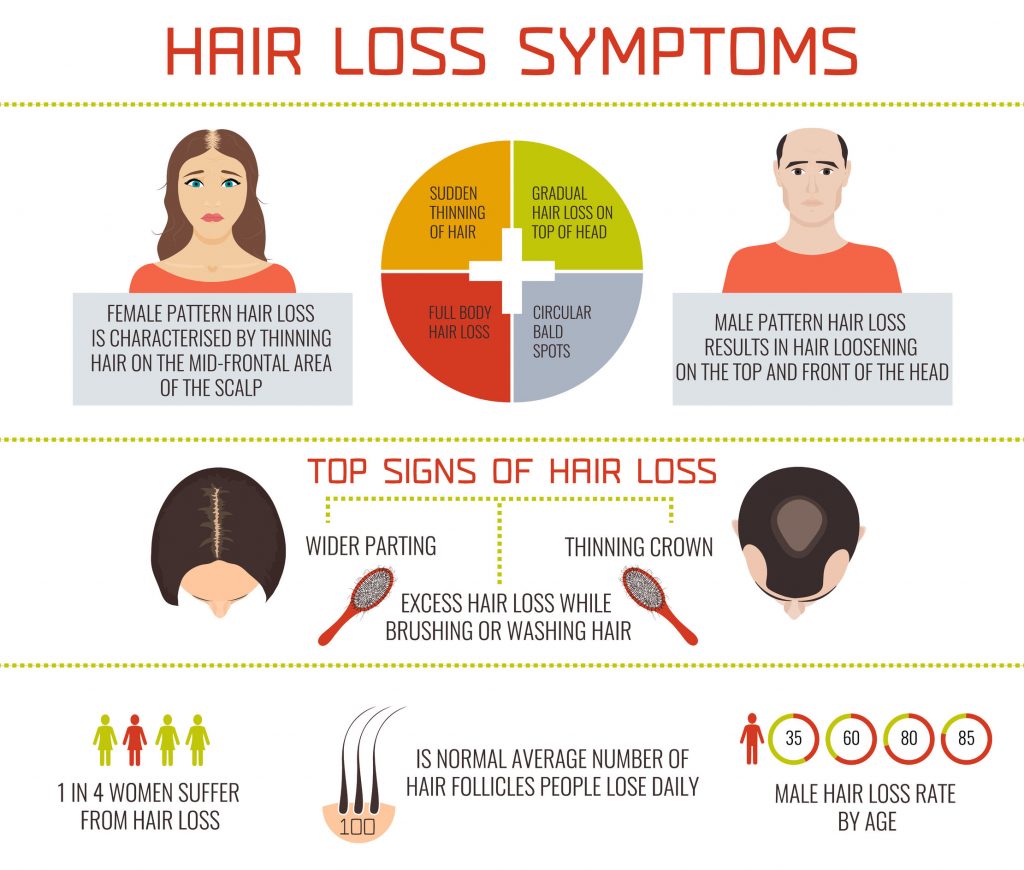Top 5 Reasons for Hair Loss in Women

What are the top 5 reasons for hair loss in women?
Top Reasons for Hair Loss in women include
- Genetic Hair Loss (Female and Male Pattern Baldness) – usually progressive – must be treated
- After Pregnancy – Hormonal changes – usually temporary
- Tight Hair Styles – Traction Alopecia – Sometimes permanent must be treated
- Shock hair loss – Usually Temporary
- MenoPause – Hormonal changes – can be permanent if not treated
![]() Hair Loss in women is more common than you think and the reason for hair loss is not always the same. Hair Loss in women, just like men, women can experience Hair Loss for a variety of reasons.
Hair Loss in women is more common than you think and the reason for hair loss is not always the same. Hair Loss in women, just like men, women can experience Hair Loss for a variety of reasons.
When it comes to Hair Loss in women, there is a different view for men and women. While some men are bothered by their thinning hair, no one thinks twice when a man walks into a room with a completely bald head. Society has even marketed the common bald male head (caused by male pattern baldness) as SEXY and irresistible.
When a woman begins to lose her hair, the social stigma is very different from male hair loss. It is considered unattractive and never sexy when women lose their hair. Although Hair Loss does regularly occur in women, society has yet to come to terms with it. There are several differences when it comes to Hair Loss in women versus men, though there are also some that are the same. Genetic hair loss as an example can occur in both men and women. Contact Dr. Slater for a consultation today.
Women Can Have Male Pattern Baldness
A woman never wants to hear that she could have a male hair loss problem, like male pattern baldness. Genetic hair loss in women is similar to male pattern baldness, but it occurs in women. We will refer to hair loss in women as female pattern baldness from here on out. Hair loss in men may be miserable for a man, but for a woman, it is nearly catastrophic.
Genetic Hair Loss in women include Female Pattern Baldness
Apart from genetics, hair loss in women can arise from a variety of causes such as hormonal changes (including pregnancy), an underlying medical condition, and stress. That is why the management of hair loss in women is different than it is for men.
Is your part widening? Have you noticed that your ponytail is thinner these days? You may have female pattern hair loss. This means women tend to continue losing hair. Women, however, do not lose all of their hair, as do some men. Instead, your part often gets wider. Hair near your temples may recede. Without treatment, some women eventually develop widespread thinning.
Treatment can prevent hair loss from worsening and help women regrow their hair.
Platelet-rich plasma therapy: This therapy uses your own blood. After a blood draw, the blood is placed into a machine that separates the blood into its different components. The platelets, which are a type of blood cell, are treated and injected into your scalp.
It is believed the platelets help stimulate your cells to grow hair. Researchers are just beginning to study this therapy as a treatment for hair loss. The early findings show promise, but more studies are needed to know whether this is a safe and effective treatment for female hair loss.

Hormonal Hair Loss – After Pregnancy
Women who are pregnant often notice that their hair is thicker and healthier looking than normal. This is because pregnancy causes increased production of estrogen, which has a positive effect on hair growth. It causes more hair follicles to enter the anagen (growth) phase which means they are actively producing hair.
However, after the baby is born, estrogen levels drop, and more hair lapses into the telogen (resting) phase. In a process similar to the one outlined above relating to menopause, miniaturizing occurs, and hair is shed during washing and brushing.
The good news is that hair loss during pregnancy should be a temporary issue. The follicles that have recently lost hair should return to a growth phase in two to six months, although it takes longer for nursing moms. If you are not sure why you are losing hair and live in Atlanta, contact Dr. Slater and the team for a consultation.
Traction Alopecia is a common cause of Hair Loss in women
A common reason for Hair Loss in women is a condition called “Traction Alopecia.” Traction Alopecia can occur when hairstyles such as tight ponytails, braids, hairpieces, and weaves cause unnaturally prolonged pulling on the hair follicles. This pulling can cause stress and damage to the hair follicles and eventually lead to permanent hair loss in the areas the pulling occurs.

Traction Alopecia is caused by tight hairstyles. PRP can be effective for this type of hair loss in women. Are you facing Traction Alopecia? Find out more
Receding hairlines, bald spots around the hairline, and overall thinning where the pulling took place are evidence of Traction Alopecia. Sometimes the damaged hair follicles can be stimulated by injecting Platelet Rich Plasma into the area of hair loss and regrowth of the hair is a possibility. In extreme cases, the only way to grow the hair back is via Hair Transplantation. No worries though, Dr. Slater offers FUE Hair Transplantation ( Not scar hair restoration) and it’s effectively treated hundreds of patients.
Schock Hair Loss
Reasons for Hair Loss in women and men include shock or trauma to the body. The medical term for this type of hair loss is telogen effluvium This type of hair loss can occur when the body goes through a major change or trauma suddenly. Car accidents are often the cause of Shock loss (telogen effluvium).
When the hair cycle functions normally, 80% of our hair remains in the active growing phase, and 20% remains dormant (not growing). When there is a shock to our system, much of the hair that is in the active growth cycle can stop growing and enter into the dormant stage. This can lead to sudden and excessive hair loss in women and men.
Pregnancy, crash diets, and stress can also lead to telogen effluvium. The good news is that this type of Hair Loss is usually temporary. Once the stress or shock subsides, the hair goes back in the active growth cycle.
What is the Cause of Hair Loss during Menopause?
If it wasn’t difficult enough, following menopause, women are far more susceptible to hair loss than they were in their younger years. They develop significant levels of thinner hair shafts and loss of hair, which often starts just behind the frontal hairline and extends to the back and sides of the scalp. This condition may be linked to the loss of estrogen hormones during menopause which had previously served as protection against the male hormones that cause thinning.
The effect of estrogen is to extend the growth phase, so this means that more hairs are in the growth phase at any one time and there is an appearance of a full head of hair. Following menopause, estrogen levels are lower and the growth phase of hair is shorter. More hair goes into the resting phase, also called the telogen phase, which is characterized by continued shrinkage of the follicle.
Trending Nonsurgical Treatments
What is PRP Therapy or Platelet Rich Plasma Treatment?
Platelet Rich Plasma is derived from the patient’s blood and contains important growth factors that can stimulate healing in our bodies. PRP has made a name for itself in Aesthetics within recent years but has been popular in the Dental and Orthopedic Industry for decades. Learn More about PRP Therapy as a nonsurgical Hair Restoration method. PRP Therapy can be effective for Hair Loss in women and men.

In Closing
Dr. Slater, our board-certified Medical Director of Buckhead Hair Restoration and Slater Aesthetic in Atlanta has 30 years of medical experience and found that the most important thing is not to guess the cause of your hair loss. There are many reasons for hair loss in women and he recommends visiting a qualified physician prior to purchasing pills, laser combs, and other products in hopes to grow your hair back. It is tempting to go online and order away, but that move could potentially make the hair loss worse.
We offer PRP Therapy, Fue Hair Restoration, Light Therapy, Bioidentical Hormone Replacement Therapy, Supplements, and more! Learn more about Hormone Therapy. Dr. Slater will first determine the cause of your hair loss and then come up with an individualized treatment plan to remedy your hair loss.
If you or someone you know is suffering from hair loss, book a consultation with a qualified physician to find out the causes and treatment options.
Wondering how much a Hair Transplant Costs?
The best way to determine cost is to call us at 770-629-9331 or set up a consultation with Dr. Slater. If you live in the Atlanta area, we would love the opportunity to offer an effective personalized Hair Loss treatment plan that can help you restore your lost hair.
Oops! We could not locate your form.
*Patient Results vary and are not guaranteed. Articles are provided for informational purposes only. Article contribution by Ellen J. Jackson






